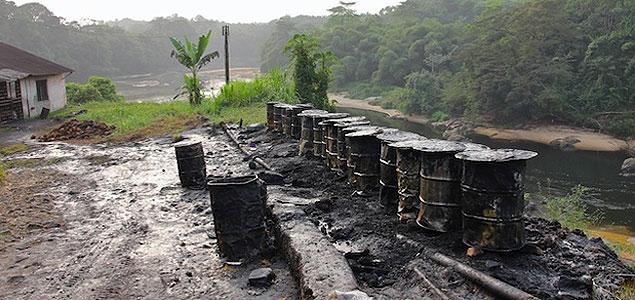
SAUDI PRICE WAR

Crude oil prices are still about half their value compared with a year ago, but the now prolonged slump is unfolding such that another rise could be on the horizon, a panel of industry observers agreed on May 20 during the XXIV La Jolla Energy Conference in La Jolla, Calif.
The panel's most bullish outlook came from Peter Tertzakian, chief energy economist and managing director at Calgary-based, energy-focused private equity manager ARC Financial Corp., who believes there may be an eventual "rapid escalation of prices" if there's a continuation of the current "price war," which he sees lasting at least another 9 months.
That price war being waged by the Saudis—whom he describes as "the establishment" that relies on production from legacy oil fields—against US shale, the newcomer that offers quick payback periods and higher returns, is part of a world of oil that's destabilizing, and the past year is only "just the start," he stated.
As industry observers focus on rig counts as a measure of the market's temperature at a particular moment, Tertzakian emphasizes what he sees as a far more important metric—the cancellations of megaprojects, or what he describes as "the baseload of oil production" from areas such as the Alberta oil sands, North Sea, and offshore Africa and Brazil.
He noted that from mid-February to the end of March, 31 big projects were cancelled internationally, including 13 alone in Tertzakian's home province of Alberta. The cumulative absence of those projects will cause a supply void 3-5 years for now, he predicts. "It's going to be quite a while before companies open up their wallets and invest again."
The second metric to watch is what he calls the "human metric." Skilled employees who have been laid off in recent months are unlikely to return to the industry—the North American economy is healthy compared with the previous downturn in 2008-09—and alternative industries will hire those workers away for good. "There are many [oil field] services companies that will probably last a few more months, but they're probably not going to make it before the end of the year." Those companies have been cutting prices at the expense of their own profit.
Neither he nor David A. Pursell, managing director and head of securities at Houston-based integrated energy investment and merchant bank Tudor, Pickering, Holt & Co., thinks the recent low prices are sustainable for oil and gas companies. "Oil cannot stay at $50/bbl," Pursell asserted, mentioning the absence of net production growth outside the US and Canada, and the lack of non-OPEC growth at $100/bbl.
Referring to the US, Pursell said, "If 1 million bbl/day of oversupply cuts the price in half, to get back to $85/bbl, maybe we just have to be 1 million b/d undersupply. That's a 2-million b/d swing. That's not very much." He noted that the Saudis have the best balance sheet out of all the players, so "why take the boot off the neck right now?" However, he doesn't believe their excess output capacity is 12.5 million b/d.
Tertzakian mocked the notion of a "swing producer," whether it's Saudi Arabia or US shale, because it assumes perfect elasticity, which doesn't exist.
Price impact on Latin America
In Latin America, the need for investment from outsiders is more evident than ever, but low oil prices only serve to further muddy an already complex issue. Francisco Monaldi, visiting professor of energy policy at Harvard University's Kennedy School of Government, noted that Latin America is the only region in the world that missed the oil boom.
Countries such as Mexico, Argentina, and Venezuela have suffered declines in production over the past few years, and now they are doing everything in their power to make up lost ground, he said. But underlying political and economic instability are discouraging international companies from offering their much-needed resources and expertise.
During a separate May 21 panel discussion on the impact of low oil prices on mergers and acquisitions activity, Vincent Hahn, principal at global asset management firm Carlyle Group, cited as an example investments during previous years in several Brazilian services companies—many of which were part of the massive corruption scandal involving state-owned Petroleo Brasileiro SA (Petrobras) that led to an overhaul of its leadership —representing the downside risk associated with directing money into the country.
Carlos A. Sole, partner at law firm Baker Botts LLP, emphasized the debt pressure on companies in the current environment. He mentioned that Petrobras just signed a $7-billion financing deal with China Development Bank, an indicator of the company's financial distress in the wake of the scandal, which has caused the company to increase its planned divestments and write down billions.
He said the deal by Mexican multinational conglomerate Alfa SAB de CV and British energy firm Harbour Energy Ltd. to acquire Pacific Rubiales Energy Corp. is unique in that Pacific Rubiales carries considerable debt—about $4.7 billion net.
In Mexico, where the outlook is more positive, Hahn said investment over the next 10-20 years could be "mindblowing," but investors have to be patient as different entities—government and business—adapt to the large-scale reforms. He believes midstream in Mexico is a "big opportunity" for private equity, evidenced by the recent BlackRock Inc. and First Reserve Corp. purchase of stake in two Pemex-owned gas pipelines. But Sole pointed out that the country is competing with the US and other Latin American countries for investors.
Hahn also said that in the US, "right now there are predators and there is prey." Some companies need capital to survive while others need it to seize the opportunity to strategically expand their asset bases. The Carlyle Group, for instance, is heavily focused on US investment as there is little government risk compared with countries in Latin America.
ogj.com





